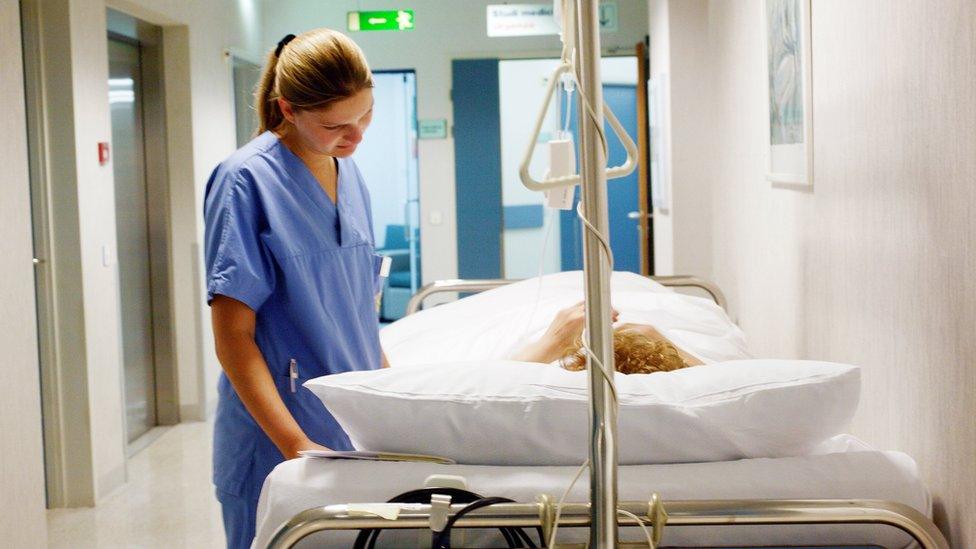'Thousands' hit by late-cancelled operations
- Published

Tens of thousands of operations were cancelled by English hospitals last year but not officially counted, figures obtained by the BBC suggest.
About half of trusts provided details of cancellations one to three days before admission.
Hospitals must record cancellations on the day of an operation or of admission - but not those prior to that.
But Ipswich Hospital has now said it will start keeping records of earlier cancellations.
NHS England said official figures showed less than 1% of operations were cancelled at the last minute.

Analysis
By Caroline Parkinson, Health editor, BBC News website
These figures shine a light on a hidden issue. Hospitals don't have to record these early non-medical cancellations, so the data provided by these 74 hospitals is the only indication we have of the extent of the problem.
There is a view that the more notice a patient gets of a cancellation the better, because it allows more time to rearrange plans.
But if operations are cancelled outside the official period, patients don't have the same rights to a date for their rescheduled operation.
Of course, sometimes patients themselves cancel an operation at the last minute.
And while very few hospitals had that data, the information from those that did suggest it could be a bigger problem than hospitals cancelling themselves.

Official NHS England figures show about 7.7 million planned operations were carried out in England last year.
There were 71,370 last-minute cancellations - either on the day the patient was meant to arrive, after they had arrived or on the day the operation was meant to take place.
In each case, NHS rules say a patient should be offered a new date within 28 days.
If that deadline is missed, hospitals are not paid for the operation, and it is recorded in official figures.
However, operations cancelled outside of the official definition are not subject to the same rules.
In Scotland, Wales and Northern Ireland, the definition of last-minute cancellations is wider - and is taken over several days.
The BBC asked all 156 NHS trusts in England, via a Freedom of Information request, to provide figures for operations cancelled one to three days before a patient was due to be admitted.
Seventy-four provided data suggesting they had cancelled 41,474 operations within that period - as opposed to 33,400 last-minute cancellations recorded for the same trusts in the official figures.

'Like a piece of meat'

Iona Hevican from Cornwall waited a year for a planned hysterectomy operation, which was cancelled three times before it went ahead.
She told the BBC: "Every time they give you a date to go in for your operation there's a lot of preparing before you go in for that date, so any cancellation that you get is obviously a very traumatic time because of all the plans that you made, all your mindset, everything.
"Then just to say come back tomorrow, like you're nothing, like a piece of meat, then that's not good.
"They have to realise what goes into planning. They have to plan, and we have to plan."

The main reasons for cancellations were a lack of beds or ward space and staff shortages.
For operations cancelled on the day, emergencies take priority - something that can have a knock-on effect for operations scheduled for the following day as well.
Twenty-nine trusts also provided data for cancellations made by patients themselves, which in many cases were higher than the number cancelled by the hospitals.
An NHS England spokeswoman said: "The proportion of patients seeing their operations cancelled at the last minute remains under 1% in spite of record numbers of operations being scheduled.

"Our national data collection rightly requires trusts to focus on monitoring the number of last-minute cancellations, as this is where the most distress is caused for patients.
"Hospitals should continue to ensure that every effort is made to reschedule cancelled operations as soon as possible."
Scotland measures cancellations within 48 hours of the planned procedure. Figures published monthly show between 1-2% are cancelled for non-clinical reasons.
In Northern Ireland, around 1,000 operations were cancelled in 2015 for non-clinical reasons on the day, or the day before.
In Wales, around 1% of operations are cancelled for non-clinical reasons.

'Constantly juggling'
The Queen Elizabeth Hospital in King's Lynn only saw five operations cancelled in 2015 one to three days before admission
Chief executive Dorothy Hosein said its success was down to "a lot of pre-planning".
The hospital, which cancelled 309 operations on the day in 2015, has three bed-planning meetings every day and is "constantly juggling bed space and day surgery".
Mrs Hosein said: "It is critical to patients, so planning ahead is essential.
"We have put a focus on not cancelling operations.
"The planning a patient does to get to this hospital is quite significant, mentally as well as around their lifestyle."

Saffron Cordery, director of policy and strategy at NHS Providers, said: "There are many reasons why operations are cancelled at short notice.
"Some of these may be due to poor scheduling and a lack of effective planning, but this is very often not the case.
"Increasingly, we are hearing from NHS trusts that it is often down to a more general lack of availability of critical care beds and a lack of anaesthetists and surgeons.
"It is also often down to ever increasing emergency cases requiring theatre time that exceeds level of demand that has been expected."
Nora Cooke O'Dowd, a research analyst at the Nuffield Trust, said: "If a person's operation has to be cancelled, it would be better if they are given as much notice as possible.
"It's stressful to have it cancelled on the day - the more notice, the better."
But patient groups say cancelled operations could have a serious impact on people's health.
Katherine Murphy, chief executive of the Patients' Association, said: "You can't underestimate the upset for them, their family, their friends and everybody else if an operation is cancelled."
Mrs Murphy said the association heard about the impact of cancelled operations "every day".
"We are talking about individuals who are often in pain or suffering," she said.
"They will have made lots of arrangements.
"It can have a huge psychological or financial impact on people."
- Published22 September 2016

- Published13 May 2016

- Published5 July 2016

- Published11 February 2016
